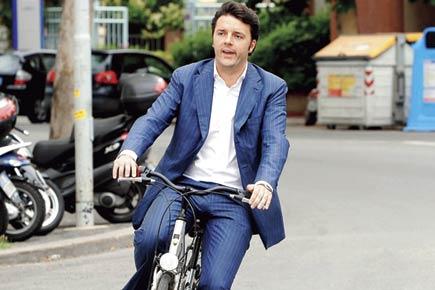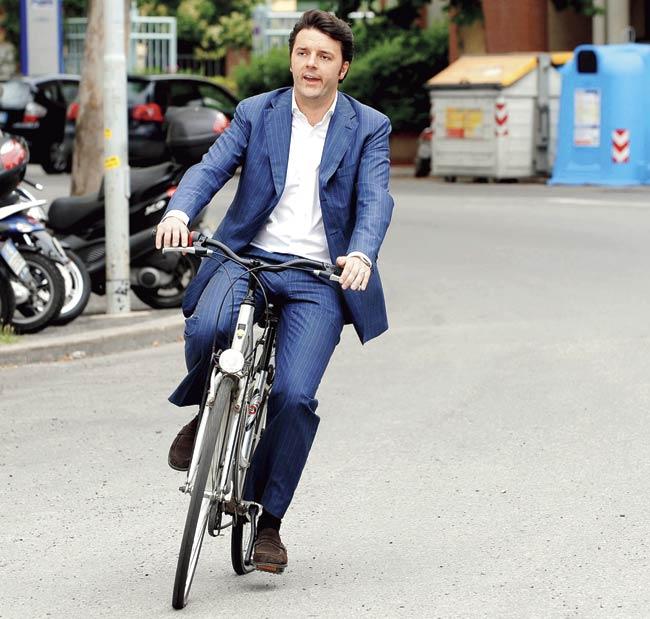Italian Prime Minister Matteo Renzi said he would resign after suffering a crushing defeat on Sunday in a referendum on constitutional reform, tipping the euro zone's third-largest economy into political turmoil


Matteo Renzi. File pic
Rome: Italian Prime Minister Matteo Renzi said he would resign after suffering a crushing defeat on Sunday in a referendum on constitutional reform, tipping the euro zone's third-largest economy into political turmoil.
ADVERTISEMENT
His decision to quit after just two and a half years in office deals a blow to the European Union, already reeling from multiple crises and struggling to overcome anti-establishment forces that have battered the Western world this year.
The euro fell to 20-month lows against the dollar, with markets worried that instability in heavily indebted Italy could reignite a dormant financial crisis and deal a hammer blow to the country's fragile banking sector. Renzi's resignation could open the door to early elections next year and to the possibility of an anti-euro party, the opposition 5-Star Movement, gaining power in the heart of the single currency.
5-Star campaigned hard for the 'No' vote. "I take full responsibility for the defeat," Renzi said in a televised address to the nation, adding that he would hand in his formal resignation to President Sergio Mattarella on Monday. "I will greet my successor with a smile and a hug, whoever it might be," he said, struggling to contain his emotions when he thanked his wife and children for their support.
"We are not robots," he said at one point. Mattarella will consult with party leaders before naming a new prime minister -- the fourth successive head of government to be appointed without an electoral mandate, a fact that underscores the fragility of Italy's political system. Renzi won a little over 40 percent of the vote in Sunday's referendum, a far worse result than polls had predicted.
It ended months of campaigning for a reform that he said would have brought political stability to Italy but that opponents said jeopardised democratic checks and balances. The new prime minister, who will need the backing of Renzi's Democratic Party (PD) to take office, will have to draw up a new electoral law, with the 5-Star urging a swift deal to open the way for elections in early 2017, a year ahead of schedule.
"From tomorrow, we will start work on putting together 5-Star's future programme and the team of people that will make up a future government," said Luigi Di Maio, who is tipped to be the group's prime ministerial candidate. Opinion polls show the PD is neck-and-neck with 5-Star, which wants to hold a referendum on membership of the euro. Italy's bond market could face fresh turbulence on Monday, with investors seeking a premium to hold Italian debt in a time of uncertainty. The nation's banks, which have lost almost half their value on the Milan bourse this year, might also be hit.
DEMOLITION MAN
Renzi, 41, took office in 2014 promising to shake up hidebound Italy and presenting himself as an anti-establishment "demolition man" determined to crash through a smothering bureaucracy and redraw the nation's creaking institutions. Sunday's referendum, designed to hasten the legislative process by reducing the powers of the upper house Senate and regional authorities, was to have been his crowning achievement.
However, his reforms so far have made little impact, and the 5-Star Movement has claimed the anti-establishment banner, tapping into a populist mood that saw Britons vote to leave the European Union and Americans elect Donald Trump president. In one relief for mainstream Europe, Austrian voters roundly rejected on Sunday a candidate vying to become the first freely elected far-right head of state in Europe since World War Two, choosing instead a Greens leader as president. But elsewhere the old-established order is in retreat.
French President Francois Hollande announced last week he would not seek re-election next year and even German Chancellor Angela Merkel looks vulnerable as she seeks a fourth term in 2017. The biggest immediate loser from the 'No' triumph in Italy could be Italy's third-largest bank, Monte dei Paschi di Siena, which is bowed by bad loans and is looking to raise 5 billion euros ($5.3 billion) this month to stave off collapse. A consortium of investment banks willing to underwrite the cash call will meet Monte dei Paschi's management on Monday to decide whether to go ahead as planned, a source close to the matter said on Friday.
Investors are likely to shun the operation if political chaos prevails, meaning a state intervention will be needed to save it. Several other lenders also need a cash injection to stay afloat, raising fears of a domino effect. Economy Minister Pier Carlo Padoan, seen as a possible candidate to replace Renzi, sought to calm nervous markets on Friday, saying there was "no risk of a financial earthquake" if 'No' wins, though there may be "48 hours of turbulence".
 Subscribe today by clicking the link and stay updated with the latest news!" Click here!
Subscribe today by clicking the link and stay updated with the latest news!" Click here!







